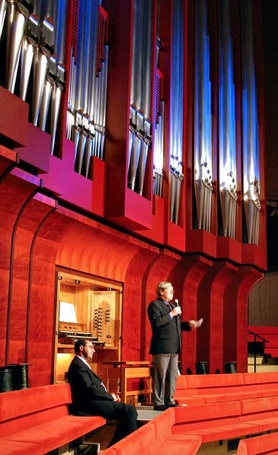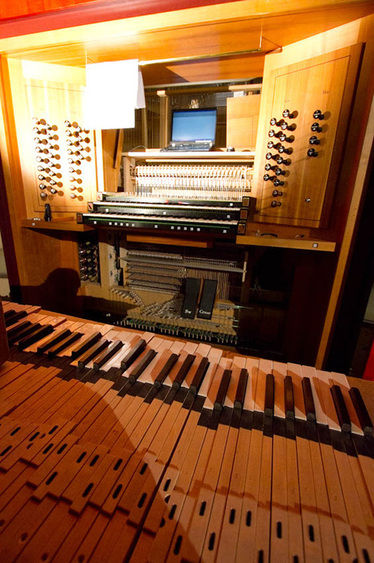Friends of the Christchurch Town Hall Organ Trust
by Peter Barton and David Towns, November 2010
|
The Rieger organ was opened on 15 May 1997 by the then Minister of the Arts. Martin Setchell, Associate Professor in the School of Music, University of Canterbury, and University Organist, was appointed as Organ Curator, a position he still holds. Martin embarked on a programme of promoting the organ and its use, gathering together a number of interested local persons to assist him in this work. It became clear that a more formal organisational structure was needed, particularly when it came to making application to community funding groups for funding to mount a programme of concerts given by organists from other centres and overseas. Accordingly, in December 2003, a Trust was formed, styled the Friends of the Christchurch Town Hall Organ Trust, and duly incorporated under the Charitable Trusts Act 1957. The Trust was subsequently registered as a charitable entity (registration number CC11004) by the Charities Commission under the Charities Act 2005. Charitable status was granted to the Trust by IRD on 23 January 2004 under the 1957 Act and subsequently under the 2005 Act (IRD number 87-007-677).
Support the Christchurch Town Hall organ by joining and/or donating to The Friends of the Christchurch Town Hall Organ Trust
If you would like to donate towards the work of the Friends of the Organ to help towards future of concerts and the organ in the town hall, donations of $5 or more are tax deductible and will be receipted. They can be made direct to our account through online banking:
Account Name: Friends of the Christchurch Town Hall Organ Trust Account No: 02-0875-0001831-000 Please enter ‘Donation’ in the Reference line. For a receipt if donating online, email the treasurer at [email protected], giving your name, address, amount and date donated. |
|
Trustees are elected at the Annual General Meeting of the Trust and the Trustees in July 2020 were:
- Susan Gilmour (Treasurer)
- Rosalie Dean (Secretary)
- Martin Setchell (Organ Curator)
- Nicholas Sutcliffe (Associate Organ Curator)
- Grant Hadley
- Lynley Clarke
Primary objects of the Trust
To raise and hold such funds as are required:
To carry out such other activities as are consistent with the charitable objects of the Trust.
There are a further ten secondary objects designed to support the above primary objects.
- To maintain and preserve the Christchurch Town Hall Rieger Pipe Organ as part of Christchurch’s cultural heritage;
- To support the work of the Organ Curator.
- Support and facilitate a continuing contribution by the Organ to Christchurch’s musical life;
- Ensure that the Organ will be able to play a vital role in concerts and ceremonies held/performed at the Christchurch Town Hall;
- Enable members of the public to be provided with the benefit and enjoyment of the organ.
To carry out such other activities as are consistent with the charitable objects of the Trust.
There are a further ten secondary objects designed to support the above primary objects.
Work of the Friends Trust
|
Since its establishment, the Trust has promoted vigorously the annual international organ concert series, giving on average three concerts each year. The Trust is responsible for raising sufficient funds each year to pay for the rental of the Town Hall auditorium for each concert (approx $5,500 per concert), Town Hall management fees, technical costs, promotion and publicity costs as well as the visiting organists’ performance fee and accommodation costs. These funds are obtained by the Trust from groups such as the Canterbury Community Trust and other community charities. The Trust was previously able to apply for, and did receive, grants under the Council’s event seeding fund, but when the Council changed the basis of its community funding two years back, the Trust no longer qualified under the new conditions. Other than the special venue hire discount which the Trust can apply for through the Civic Music Council to Vbase, the City Council does not provide any direct support to the Trust. The organ, funded mainly (96%) by civic fundraising and now being substantially upgraded by a generous citizen, represents a vastly appreciating asset but also one with valuable additional resources once the upgrade referred to below is completed in February 2011. The Trust also supports the work of the Organ Curator in promoting the Rieger organ.
There is a further facet to the Trust’s activities, however: the funding of capital works related to the organ as far as is possible. The Town Hall management company, Vbase, is responsible for the maintenance of the organ, including the costs of tuning (approximately three times per year), but does not undertake any capital works to improve or expand the organ. In 2005, for example, the Trust undertook to raise the funds to have the original builders (Rieger in Austria) to design and manufacture a set of lockable glass screen doors which would not only protect the console, but also leave it visible to audiences when not in use. As part of its fundraising, the Trust approached the Christchurch Civic Music Council, which was holding the final unused balance of the Town Hall Organ Fund in trust, a sum of a few thousand dollars, to obtain this balance to put towards the screen doors. The Civic Music Council agreed that the Trust was the logical recipient of the balance of funds, and transferred the $5391 to the Trust, leaving it to the Trust to undertake the capital work (screen doors) and thus closing the original Trust account. The new screen doors were installed in early 2006 and first used during a concert by international Italian organist, Massimo Nosetti. Expansion and upgrade |
|
It should be noted that the organ was never entirely completed, due to insufficient funds, for example some stops were omitted from the Bombarde section of the organ. In January-February 2011, as part of the Town Hall’s overall upgrade of facilities, the Partridge bequest allowed the organ to be substantially expanded and upgraded. The original builders of the organ, Rieger Orgelbau of Austria, who were contracted to carry out the upgrade, were then in a sense able to ‘complete’ this 3rd division of the organ by adding about 12 new stops.
These are mainly quieter ‘foundation’ stops, providing more options (for example when accompanying soloists, choirs or small ensembles), but will also ‘fill some gaps’ by providing some quiet, solo reed stops not currently available (Vox humana and clarinet). The new stops will also be enclosed and therefore able to make crescendos and diminuendos. A rather softer 16’ stop will be playable both from the keyboard and by the feet, providing an alternative, quieter bass when called for. Finally, the organ’s capacity to store registrations which can be quickly recalled in sequence during a concert will be further enhanced by an upgrade to Rieger’s specially designed, state-of-the-art electronic sequencing system. (See the specification page for a complete list of stops and aids) |
Well, this was the plan. We didn't bargain on Mother Nature.


